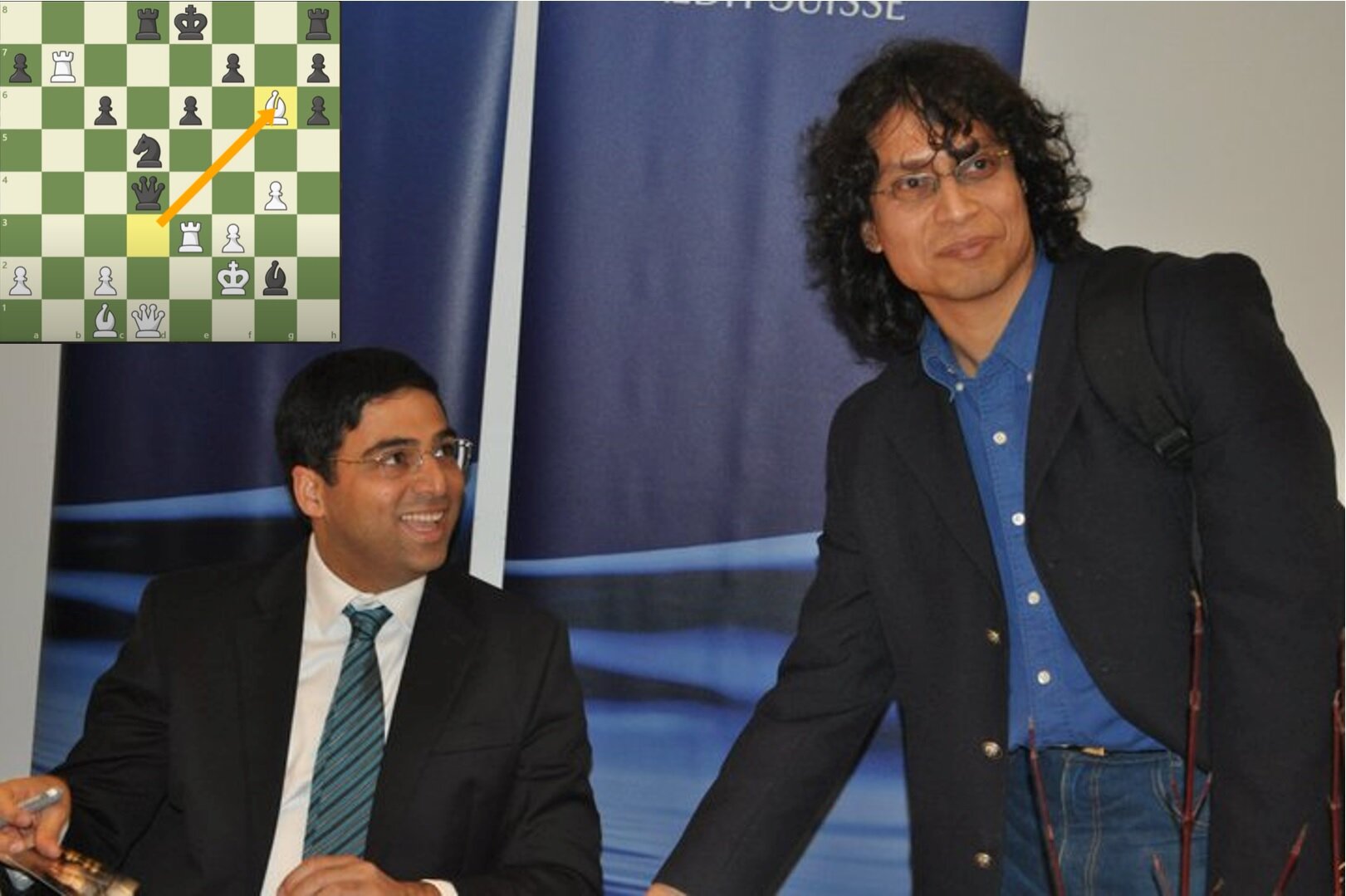by Arunabha Sengupta
That 21.Bg6 against Lautier (inset)
Simultaneously sacrificing his Queen and putting his bishop at the mercy of not one but two pawns.
That incredible double of 22.Rxe6 fxe6 23.Be7+ against Bologan …
Or 26. … Rxc4 against Radjabov that left his Queen unprotected in front of the white rook, and left his opponent susceptible to a devious 8-move combination.
And my favourite, that 16.Rxf7 till 23.Rxf6 .. a double rook sacrifice during a spectacular 10-move sequence against Sokolov that would see him win the game with two bishops and a knight against two rooks and a bishop.
Anand used sacrificial combinations like a champion pugilist, sneaking them in past resolute defence, one after the other, unexpected, undetected, lethal.
I wanted to ask him about all that.
Time was limited, questions could be few…
The session was in Zurich, but instead of Swiss League it was at a giant Swiss bank.
The official interviewer, with his limited German-accented English, was good-naturedly testing the Grandmaster’s memory, quizzing about his previous visit to the bank’s premises.
But I had specifically played his best games again and again the previous week, late into the nights. Would I get a chance to ask him about them?
There was time for just a couple of questions from the audience.
Hands were raised. Including my eager one, cloaked to the wrist in my process consulting suit. The spotlight zoomed towards me, setting my heart racing, and then moved off in a hasty fianchetto to land on the diligent IT girl towards the outer flank.
The mike was relayed … and with seconds left on the clock the question rang out from the depths of corporate-soul: “Anand, what are your values?”
The magnificent mind was finally foxed A zugzwanged middle game, each striving to become a passed pawn, eyeing that final promotional square —a game he had no idea of.
The man known for lightning moves paused and looked baffled. My colleague had done what Kasparov and Krammik had seldom achieved.
“Values? I’m sorry, what … er … do you mean by values?”
A question the uninitiated into the grand world of corporate-speak could not understand such deep .
“I mean what is your vision of life? ” my colleague insisted.
I could almost feel Anand feeling for the rooks and knights and finding rats crouching along a1 to h1, ready to scurry across towards a8 to h8.
He confusedly mumbled something about chess, enjoying the game, spending time with his family. My colleague was gratified. Perhaps the work-life-balance checkbox was ticked.
The spotlight moved away, seeking questions for the one final time, far far away from me. In any case, my mind was by then locked in the idea of stale-mates.
Thankfully the remaining question was by a rare youngish bald-headed misfit in the gathering, about a sequence of knight moves. The smile crept back into Anand’s face as he answered, chased by the knight the rats had probably dropped off the board.
(I never saw that bald-headed guy again in my six years in the Zurich bank. To this day I believe he had sneaked in to get a glimpse of the champion.)
I will be stretching facts if I say this was the tipping point that made me move away from corporate life. No, it was not.
However, when I did take the decision, when checks and balances were exchanged, circumstances ruled like a series of discovered checks — but the first question of my colleague did stick around on the decision board like an isolated pawn., disfiguring the shades of black and white.
But then, the field I did pursue, was it much different?
The one who remains the patron saint of that profession would have abhorred writing about chess … too cerebral, too difficult to fake expertise, too much hard work.
Imagine how much more nonsensical these lines would have read: “There ought to be some other means of reckoning quality in this most royal of games of Zweig, the chessboard is an ass.”
Between the chequered black and white, life is forever an unstructured blend of grey.
As the picture shows, I did get to meet him on that day. Time was too short to ask him about the games. Instead I asked him about the age-related challenges in the career of a chess champion, and he promised to do his best to extend his career.
He has kept his promise.
Viswanathan Anand. The Master turns 51.

